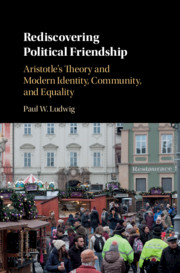Book contents
- Rediscovering Political Friendship
- Rediscovering Political Friendship
- Copyright page
- Dedication
- Epigraph
- Contents
- Preface and Acknowledgments
- Introduction
- Part I Foundations of Friendship
- Part II Where Is Civic Friendship Today?
- 3 Why Associations Replaced Civic Friendship
- 4 Why Associations Are Really Civic Friendships
- Part III A Different Way to View Liberalism
- Part IV Conclusion
- Works Cited
- Index
4 - Why Associations Are Really Civic Friendships
Finding the Balance between Associations and the State
from Part II - Where Is Civic Friendship Today?
Published online by Cambridge University Press: 12 December 2019
- Rediscovering Political Friendship
- Rediscovering Political Friendship
- Copyright page
- Dedication
- Epigraph
- Contents
- Preface and Acknowledgments
- Introduction
- Part I Foundations of Friendship
- Part II Where Is Civic Friendship Today?
- 3 Why Associations Replaced Civic Friendship
- 4 Why Associations Are Really Civic Friendships
- Part III A Different Way to View Liberalism
- Part IV Conclusion
- Works Cited
- Index
Summary
Aristotle valued small associations more than today’s liberals: he considered villages, fraternal organizations and guilds to be civic friendships in their own right. He criticized utopian theories such as Plato’s Republic for quixotically attempting to destroy associations. In liberal democracies, associations formed to tackle causes reproduce some of the advantages of the small polis: in such associations, each member acts in view of his fellow citizens, and thus is influenced by the moral suasion of the group. Each perceives the influence he exercises, seeing the local impact of his power and taking ownership of incremental social change. Rethinking associations as civic friendships runs up against the problem of involuntary associations with their “solidarity and hostility.” Michael Walzer would correct liberalism’s deracinating tendencies by incentivizing us to remain in our involuntary identity groups. But his plan to channel government benefits through such groups would compromise the groups he means to help. To break the stranglehold of the bad associations—lobbies—to clear space for good associations, Congressional reforms are needed.
Keywords
- Type
- Chapter
- Information
- Rediscovering Political FriendshipAristotle's Theory and Modern Identity, Community, and Equality, pp. 162 - 188Publisher: Cambridge University PressPrint publication year: 2020

